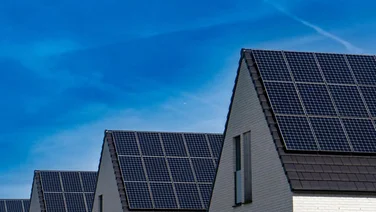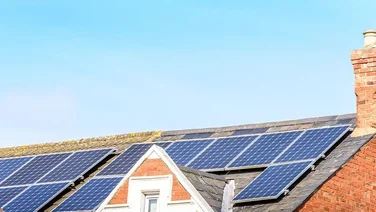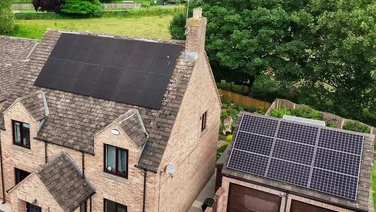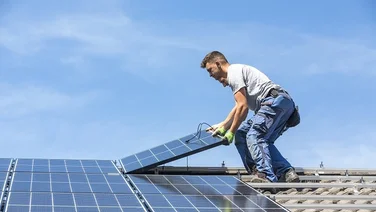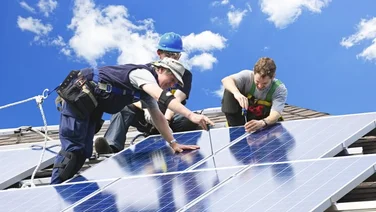✔ Solar shades function the same way as solar panels
✔ You won’t be able to power your entire home with solar shades alone
✔ Solar shades typically cost about £925 per two square metres of window space
Solar shades are one of the latest innovations in solar panel technology, transforming our windows into electricity-generating wonders.
In this article, we explain exactly what solar shades are, how much they cost, whether your home is right for them, and how they’re installed. Read on to find out all you need to know.
Alternatively, if you’re ready to start searching for solar panels, we can help you compare prices. All you need to do is enter a few details about your home into the form, and we’ll put you in touch with our trusted suppliers. They’ll provide you with obligation-free quotes for you to compare.

What are solar shades?
Solar shades, also known as solar blinds, are essentially miniature solar panels, adjusted to fit the shape of typical window blinds. They function like regular window blinds, only with the added benefit of generating free, clean electricity.
Instead of simply blocking out sunlight from the property, solar shades use photovoltaic materials to convert the sunlight into electricity, which you can use to power your home.
Because of their size, solar shades won’t be able to produce the same level of electricity as a full solar panel system, so it’s best to pair them with solar panels to maximise the benefit.
However, they are still beneficial compared to not installing any green technology, especially when it comes to lowering the average electric bill in the UK.
How do solar shades work?
Solar shades work exactly like solar panels – they absorb sunlight and turn it into electricity. Already got yourself some panels? These shades will make your home even greener by taking advantage of all the sunlight that’s normally blocked by window sunshades.
Most solar shades come with the ability to automatically adjust according to the angle of the sun, in much the same way flowers do –think of how a sunflower moves throughout the day to take maximum advantage of the sun’s rays.
Some solar shades also come with a smart app that allows you to control when they open and close. Users can also receive information through the app about how much electricity they’re generating.
You can read our guide on how solar panels work for information on the ins and outs of solar systems.

How much do solar shades cost?
Solar shades are expensive pieces of kit, especially if you intend to cover more than one window. You’ll spend an average of £3,700 on four windows (assuming a typical window size of two square metres), which will generate around 120 kilowatt-hours (kWh) of electricity per month.
However, investing in a pair of solar blinds will reduce your energy bills overall and cut your carbon emissions. Using two m2 of space for solar shades will save you £31 a year on your energy bills, and 0.04 tonnes of CO2.
Three-bedroom homes have an average of eight windows, so if you applied solar shades to all of them, you could save around £248 a year, at a cost of over £8,000 for the solar blinds.
So if you can afford the upfront costs and want to make the world a greener place to live, getting solar shades is absolutely worth it.
And if you want to pair your them with a regular roof-mounted solar panel system, you can find out all about solar panel costs in our handy guide.
The pros and cons of solar shades
- Saves money on energy bills
- Can be installed in any home with windows
- Customisable – can be adjusted to fit most window styles
- Upfront costs are expensive
- Not as effective as solar panels
- Might not be as aesthetically pleasing as regular blinds
- Not as resistant to bad weather as solar panels
If you want to generate clean electricity, and have the money to invest, solar shades are a great choice.
And if you don’t mind sacrificing some aesthetics (though this is subjective), why wouldn’t you want solar shades? They function exactly like any other window blinds but with the ability to save you money on your energy bills.
They might not be aesthetically pleasing to some people because solar shades have to be covered with photovoltaic panels to work. So that’d mean potentially struggling to match a home’s particular aesthetic with the shades.
The other downside to solar shades is that, if powering your entire home is essential, they’re not a viable alternative to solar panels. They’re great if you just want to power a few appliances, such as your computer, but you won’t be able to power much else.
On top of this, solar blinds are expensive. You can expect to pay over £1,500 for solar shades capable of doing more than charging a laptop and keeping a TV on.
Solar shades aren’t as resilient as solar panels either, because they’re thinner and are made of multiple parts.
How are solar shades installed?
Solar shades are usually installed on the outside of your window, where they can benefit from unfiltered sunlight, and should be done by a professional. Less complicated blinds, which are typically less effective, can be installed inside yourself.
Blinds installed outside will be more robust, because they’ll need to withstand the weather. In severe weather conditions however, the blinds will usually have to be fully retracted so as not to be damaged.
It can be dangerous installing sensitive equipment on higher floors, as you might either damage it or put your safety at risk. For this reason, we’ll always recommend hiring a professional to install your solar shades.
Is your property right for solar shades?
The key benefit of solar shades is that almost any home with windows can install them. Plus, solar shades – like all solar equipment – are a permitted development, and won’t need planning permission to install.
You might run into difficulty if you live in a listed building or conservation area, because blinds can affect the aesthetics of a property.
In this instance, you may need to ask for planning permission for your solar shades, in much the same way you’d ask for planning permission to install solar panels.
Do solar shades require any maintenance?
Solar shades usually need a professional maintenance survey, because they’re complicated equipment that can break more easily than a standard solar panel.
Solar panels are larger and typically comprise of a single, solid panel, whereas solar shades are multiple, thin panels spread over window blinds.
Additionally, you could have the solar shades installed on windows above the ground floor, which will require a ladder.
If you live in a flat, the solar shades might be installed even higher – though in this case they’ll likely be installed inside the window.
How popular are solar shades in the UK?
Solar shades are incredibly niche, which means they’re not very common in the UK so far, but if they’re on the same trajectory as solar panels, the numbers will be growing substantially.
1.3 million UK homes have solar panel systems installed as of August 2023 (MCS dashboard), with over 5,000 new systems installed each month.
Solar shades, like solar panels, help homes reduce their energy bills and cut carbon emissions, so we expect the number of installations to only keep increasing.
Where to buy solar shades
Ecostream is one of the best known suppliers of solar shades, with its available models capable of generating up to 100 watts per hour, with one m2 of solar shades. For context, that’s enough to charge a laptop or to power a TV.
SolarGaps is another company offering solar shades, and like Ecostream, its blinds provide 100 W per hour with one m2 of space used. Until solar technology improves, this output will likely be the standard for some time to come.
Next steps
Solar shades are a great way to reduce your energy bills, shrink carbon emissions, and limit your reliance on the grid. They’re not an effective replacement for a proper solar panel system, but they’re still worth the investment if you can afford them.
If you’d like to find out what you might spend on a solar panel system, we can help you compare prices. Simply fill in a few details about your home and we’ll put you in touch with our trusted installers. They’ll get back to you with obligation-free quotes for you to compare.


